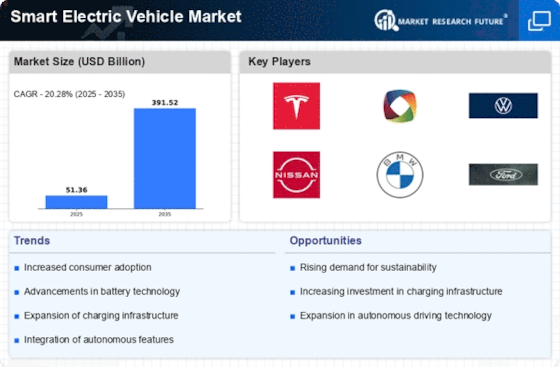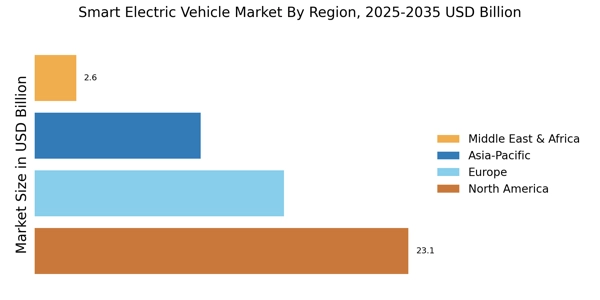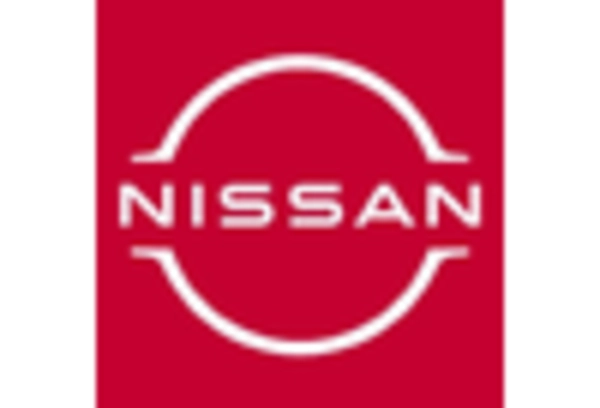Rising Environmental Concerns
The increasing awareness of environmental issues appears to be a pivotal driver for the Smart Electric Vehicle Market. As climate change and air pollution become more pressing concerns, consumers are gravitating towards sustainable transportation options. This shift is evidenced by a notable rise in electric vehicle sales, which reached approximately 10 million units in 2023. The Smart Electric Vehicle Market is likely to benefit from this trend, as more individuals seek to reduce their carbon footprint. Furthermore, the adoption of electric vehicles is often supported by various environmental initiatives, which may further bolster market growth. As a result, manufacturers are increasingly focusing on developing eco-friendly technologies, which could enhance the appeal of smart electric vehicles.
Economic Incentives and Subsidies
Economic incentives and subsidies provided by governments are likely to play a significant role in the Smart Electric Vehicle Market. Many countries have implemented financial incentives to encourage the purchase of electric vehicles, which can substantially lower the cost for consumers. For instance, tax credits and rebates can reduce the effective price of electric vehicles, making them more competitive with traditional gasoline-powered cars. In 2023, it was reported that such incentives contributed to a 30% increase in electric vehicle sales in certain regions. As these financial benefits continue to evolve, they may further stimulate demand within the Smart Electric Vehicle Market, prompting manufacturers to expand their offerings and innovate in vehicle technology.
Consumer Demand for Smart Features
The growing consumer demand for smart features in vehicles is a notable driver of the Smart Electric Vehicle Market. As technology becomes increasingly integrated into daily life, consumers are seeking vehicles that offer advanced connectivity, automation, and enhanced safety features. Smart electric vehicles equipped with cutting-edge technologies, such as autonomous driving capabilities and integrated infotainment systems, are becoming more appealing to tech-savvy consumers. This trend is reflected in market data, which suggests that vehicles with smart features are likely to command higher prices and attract a larger customer base. Consequently, manufacturers in the Smart Electric Vehicle Market are focusing on innovation to meet these evolving consumer preferences, potentially leading to a more competitive landscape.
Corporate Sustainability Initiatives
Corporate sustainability initiatives are emerging as a significant driver for the Smart Electric Vehicle Market. Many companies are adopting environmentally friendly practices and setting ambitious targets to reduce their carbon emissions. This shift is prompting businesses to invest in electric vehicle fleets as part of their sustainability strategies. Recent statistics indicate that a growing number of corporations are transitioning to electric vehicles, with some aiming for 100% electric fleets by 2030. This trend not only enhances corporate image but also aligns with consumer expectations for responsible business practices. As more companies commit to sustainability, the Smart Electric Vehicle Market is likely to experience increased demand for electric vehicles, fostering innovation and growth within the sector.
Advancements in Charging Infrastructure
The expansion of charging infrastructure is a critical factor influencing the Smart Electric Vehicle Market. As more charging stations become available, the convenience of owning an electric vehicle increases, potentially leading to higher adoption rates. Recent data indicates that the number of public charging stations has surged, with over 1.5 million stations installed worldwide by 2023. This growth in infrastructure not only alleviates range anxiety among consumers but also encourages manufacturers to innovate in vehicle design and technology. The Smart Electric Vehicle Market is likely to see a positive impact from this trend, as improved charging solutions may enhance the overall user experience and promote further investment in electric vehicle technology.

















